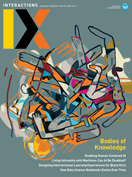Authors:
Khalia Braswell, Yolanda A. Rankin
As scholars and practitioners within the field of HCI, we often think in terms of designing technology to address a problem or to improve a societal issue. As designers, we enjoy a privileged status that allows us to use our imaginations and tools to create whatever our hearts desire. And though a body of HCI research has positioned children as designers and creators of technology, rarely do we stop to think about the privilege that white children enjoy or the disadvantages that Black children experience because of race. Moreover, when we examine the narrative about who gets to design…
You must be a member of SIGCHI, a subscriber to ACM's Digital Library, or an interactions subscriber to read the full text of this article.
GET ACCESS
Join ACM SIGCHIIn addition to all of the professional benefits of being a SIGCHI member, members get full access to interactions online content and receive the print version of the magazine bimonthly.
Subscribe to the ACM Digital Library
Get access to all interactions content online and the entire archive of ACM publications dating back to 1954. (Please check with your institution to see if it already has a subscription.)
Subscribe to interactions
Get full access to interactions online content and receive the print version of the magazine bimonthly.






